|
|
|
Sort Order |
|
|
|
Items / Page
|
|
|
|
|
|
|
| Srl | Item |
| 1 |
ID:
127307
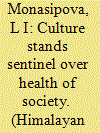

|
|
|
| 2 |
ID:
137602
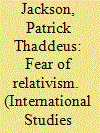

|
|
|
|
|
| Summary/Abstract |
Although scholars toss around the word “relativism” when debating the merits of various methodological approaches in international studies, there is a lack of clarity about what it might mean to have a relativist position on the production of social-scientific knowledge. As a result, a lot of the ink spilled about the potential dangers of relativism is overblown. A little philosophical and logical clarity goes a long way towards dispelling that particular bogeyman.
|
|
|
|
|
|
|
|
|
|
|
|
|
|
|
|
| 3 |
ID:
119994
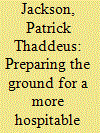

|
|
|
|
|
| Publication |
2013.
|
| Summary/Abstract |
In this reply, I take up three issues raised by the other contributors to this discussion of my book: the purpose of the intervention, the epistemic status of the typology and the question of progress in science.
|
|
|
|
|
|
|
|
|
|
|
|
|
|
|
|
| 4 |
ID:
119993


|
|
|
|
|
| Publication |
2013.
|
| Summary/Abstract |
The article looks at one of the central arguments of Patrick Jackson's book The Conduct of Enquiry in International Relations: the attempt to advance methodological pluralism and dialogue among contending metatheoretical schools of International Relations. The article supports the goal of pluralism but argues that there is a significant gap in Jackson's support of it and that his version of pluralism inhibits metatheoretical engagement of different schools of thought. The latter in turn limits the possibility of progress in the field. The article outlines the missing steps in Jackson's argument, the way in which he unduly limits the contribution that the philosophy of science can make to scientific progress and an alternative argument for pluralism that leaves a role for genuine philosophical engagement and the possibility of progress in IR.
|
|
|
|
|
|
|
|
|
|
|
|
|
|
|
|
| 5 |
ID:
139417
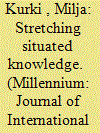

|
|
|
|
|
| Summary/Abstract |
This article is driven by the belief that there is great potential benefit in carefully considering the implications of ‘situated knowledge’ in IR scholarship. This can be helpful not just for scholars thinking through meta-theoretical puzzles in International Relations (IR), but also for shaping concrete knowledge practices in international political practice today. Yet, there seems to be something of an unresolved puzzle at the heart of the situated knowledge paradigm: a puzzle relating to what the situatedness of knowledge entails and how we should ‘deal with it’. This piece suggests that philosophical and social theoretical, and by extension also IR theoretical, engagements with situated knowledge can benefit from being considered anew: from the point of view of theoretical physicists and cosmologists. While not always reflexive concerning ‘social’ situatedness, the physicists and cosmologists considered here have reflected on aspects of situatedness that have been under-emphasised in standpoint philosophy. Crucially, physics and cosmology framings of situated knowledge can help to show why dealing with situated knowledge should mean more than attentiveness to various knowers and their positionality, and more than reflexive ‘dialogue’ between knowers; it also seems to require ‘stretching beyond’ the horizons of ‘situated knowers’. It is suggested that science is, and perhaps even ‘scientifically aspirant’ IR then should be, about imaginative conceptual ‘stretching’ rather than merely ‘situating’. This stretching should go hand in hand with opportunistic but critical methodological probing, seeking to push us ‘beyond’ how we understand the world from our situated perspectives. The provocations developed here have three main audiences in IR: scholars engaged in meta-theoretical debates in IR, those studying international politics through the situated knowledge approach, and also critical theorists seeking to understand conditions of critique.
|
|
|
|
|
|
|
|
|
|
|
|
|
|
|
|
| 6 |
ID:
101514
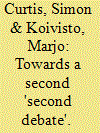

|
|
|
|
|
| Publication |
2010.
|
| Summary/Abstract |
This article examines the contemporary disciplinary claims that the 'Second Debate' in international theory was partial and incomplete. Developing the view that the debate exclusively concerned positivist methods, not the status and merits of social scientific inquiry in international relations theory (IR) more broadly, the article advances an understanding of how contemporary 'social scientific' IR has begun to integrate historicist and generalising claims in a single theoretical framework. Moreover, the article seeks to transcend the assumption of incommensurability between scientific and historical frames of inquiry that characterised the idea of scientific inquiry in the Second Debate, and does this through an intellectual history of arguments for a 'science of society'. The article shows how the emergence of non-positivist alternatives entails the development of abstractions and limited generalisations based on 'mechanismic explanation', particularly suitable for the development of middle-range theorising in IR. Overall, we argue that one important implication of the named methodological discussion is the reinforcing of the place of historical sociological analysis at the centre stage of international theory.
|
|
|
|
|
|
|
|
|
|
|
|
|
|
|
|
| 7 |
ID:
092043
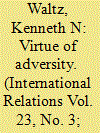

|
|
|
|
|
| Publication |
2009.
|
| Summary/Abstract |
This article is a personal account of how the author came to write his two best-known books, Man, the State, and War and Theory of International Politics. He explains the context of his early career, his army service, and some key academic influences. The article then discusses the origins of his two other major works, on foreign policy and democratic politics and on the implications of the spread of nuclear weapons. In commenting on the course of his long writing and teaching career, Professor Waltz highlights the critical importance and influence of his wife, Helen Waltz.
|
|
|
|
|
|
|
|
|
|
|
|
|
|
|
|
| 8 |
ID:
090144
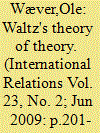

|
|
|
|
|
| Publication |
2009.
|
| Summary/Abstract |
Waltz's 1979 book, Theory of International Politics, is the most influential in the history of the discipline. It worked its effects to a large extent through raising the bar for what counted as theoretical work, in effect reshaping not only realism but rivals like liberalism and reflectivism. Yet, ironically, there has been little attention paid to Waltz's very explicit and original arguments about the nature of theory. This article explores and explicates Waltz's theory of theory. Central attention is paid to his definition of theory as `a picture, mentally formed' and to the radical anti-empiricism and anti-positivism of his position. Followers and critics alike have treated Waltzian neorealism as if it was at bottom a formal proposition about cause-effect relations. The extreme case of Waltz being so victorious in the discipline, and yet being so consistently misinterpreted on the question of theory, shows the power of a dominant philosophy of science in US IR, and thus the challenge facing any ambitious theorising. The article suggests a possible movement of fronts away from the `fourth debate' between rationalism and reflectivism towards one of theory against empiricism. To help this new agenda, the article introduces a key literature from the philosophy of science about the structure of theory, and particularly about the way even natural science uses theory very differently from the way IR's mainstream thinks it does - and much more like the way Waltz wants his theory to be used.
|
|
|
|
|
|
|
|
|
|
|
|
|
|
|
|
| 9 |
ID:
178097
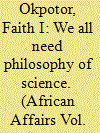

|
|
|
|
|
| Summary/Abstract |
Explaining and Understanding are considered mutually exclusive in political research. In this view, Explaining involves making observations as an outsider, with emphasis on causal laws, generalizations, and predictions. Conversely, Understanding occurs from the inside, with emphasis on meaning-making. This research note addresses Explaining, Understanding, and the related concept of reflexivity in multi-method/mixed-method research involving fieldwork. Rather than taking for granted the dichotomy between Explaining and Understanding that stems from Cartesian anxiety, I argue for the non-mutually exclusive alternative of ‘explanatory understanding’ and propose analyticism as the appropriate methodological path. An analyticist methodology involves creating a model that is a general account of a phenomenon, which is then used in case-specific analytical narratives to reveal departures from the model. Since understanding requires adequate explanation, explanatory understanding helps us better make sense of the world. Therefore, Explaining and Understanding are not merely oppositional stances between identifying causes and making sense. We cannot identify causes without making sense, and making sense involves a degree of causal inference. Explanatory understanding also necessitates reflexivity, which I conceptualize as methodological and personal positionality. I apply these arguments to my study of post-election violence in West Africa, drawing on fieldwork experience in Ghana, Nigeria, and Côte d’Ivoire.
|
|
|
|
|
|
|
|
|
|
|
|
|
|
|
|
|
|
|
|
|